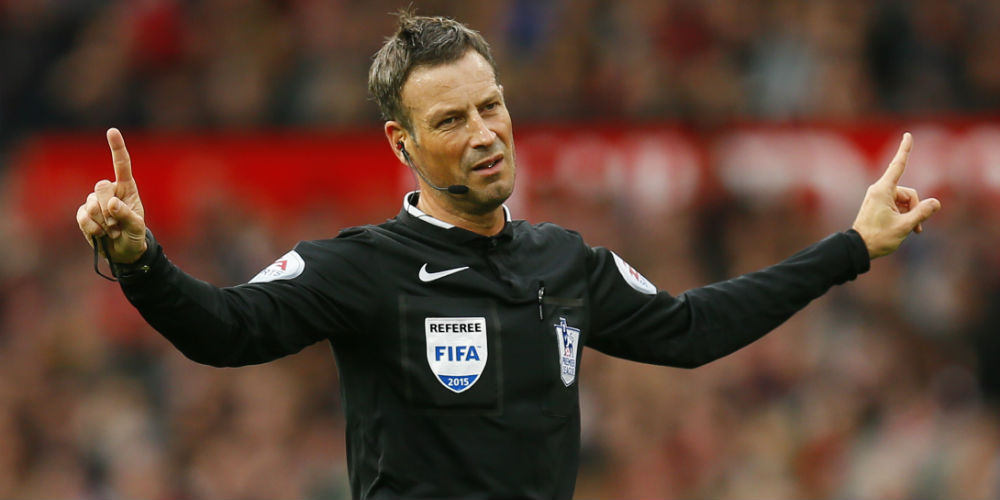Football Federation Victoria & Football Federation Australia hosted an evening with decorated international football referee Mark Clattenburg and two of Australia’s best football referees, Shaun Evans of the A-League and Kate Jacewicz of the W-League. The night was hosted by Fox Sports commentator Michael Zappone.
Mark Clattenburg is widely renowned as one of the best referees in the world, and certainly one of the most decorated. He retired from on-field duties this week after overseeing the friendly between Australia and Brazil, and will now head up the national refereeing body in Saudi Arabia. Mark refereed both the UEFA Champions League and Euro 2016 Final last year, capping off a remarkable career including many memorable English Premier League matches and the Olympic Games gold medal match.
Shaun Evans is one of the first three full time professional referees in the A-League, and received his FIFA badge this year. He has international experience, in the Chinese Super League, including the final in 2014. Shaun was in charge of the Sydney FC vs Wellington Phoenix game this year, where the Video Assistant Referee was used for the first time in the world.
Kate Jacewicz is also a FIFA badged referee who has shown remarkable consistency to be appointed to the final of the W-League for eight out its nine seasons. Kate refereed the final of the 2016 U/17 Women’s World Cup in Jordan. She is on the shortlist to be appointed to the 2019 Women’s World Cup finals in France.
All three shared their personal insights into what makes a referee successful, most of which seem to be common to officiating around the world, no matter what sport. However, there were some elements unique to the world game – such as the compromises that need to be made when refereeing two teams from differing parts of the world who play in a highly contrasting manner.
“Controlling what you can control” was a consistent theme. All three avoid social and traditional media, instead focusing on stringent self-assessment and their coach’s assessment of their performance, in order to learn from mistakes. Clattenburg gives himself a day to process the outcomes of his matches, be they good or bad, but by the next day focuses his energy on preparing for the next one, and was remarkably able to quickly return to a consistent mental state.
From a physical perspective, all his hard work was done in the pre-season. His mantra was to be as fit as possible; “that’s the easy bit”. Once games commenced, he was in maintenance mode, ensuring that his body was right to get him into the best position on game day, a key to good refereeing.
He was fastidious about his mental preparation for games, that is, to know the players, to know the team’s tactics. He once watched the first game of a series six times before refereeing the return leg the following week. This allowed him to pick up an important offensive foul in the penalty box that instantly earned him the respect of the players, coaches and commentators which propelled his career. He feels that mental strength is the most important thing for a referee, and attributes much of his success to being a perfectionist, an attribute he says is shared by arguably the world’s best football player, Cristiano Ronaldo.
Jacewicz spoke about the challenges facing modern football referees, one of which being the sacrifices that need to be made to make it to, and remain at, the elite level. Being away from family and friends for extended periods of time, missing important social gatherings, commitment to eating the right foods and dedicating time to her mind and body every day. Another challenge is the need to adapt to playing styles of different games – in one game, which needs to be managed, fouls may need to be called where in another game, where the players just want to play football, the same action may not be called. She constantly returns to the question “what’s fair for the teams, what’s fair for the game?” As we would put it – “what does footy want?” One thing that stays constant is that players look to the referee to keep them safe. This is one area where the player’s respect can be won or lost in an instant.
The term “a 60/40 decision” was mentioned a number of times, just like a “50/50” in our parlance. For these decisions, a real feel for the “balance” of the game separates the elite referees from the rest. Which way that decision goes can be determined by many factors. In the case of the first Video Assistant Referee decision, Evans felt the handball was a “60/40” decision, and elected to allow play to continue, knowing that his colleague in the box would step in if necessary, which is what happened. Unsurprisingly, Evans is a fan of the video replay. It vastly reduces the chance that a referee will make an error that influences the result of the game, and also allows the referee to move on quickly from any mistakes, preventing cascading errors. Clattenburg adds that the presence of the video replay system acts as a deterrent for players in giving away fouls, or from “simulation”.
As one of just three full time referees, Evans admits to feeling some pressure to be a better referee because of the extra time devoted to his profession. He performs some element of physical or mental preparation every day of the week – noting that it is more important to do small amounts of preparation regularly than, for example, flogging yourself on the training track a few times a week. In terms of his approach to player management, he says you need to know the individual players, and how best to interact with them, noting that there is no “one size fits all” approach. He says it is important to stick to your protocols, as players know what they can and can’t do, and will push the boundaries, but you will earn respect if you penalise them once they over-step the mark.
Clattenburg emphasized using the right tool at the right time, always with an emphasis on keeping your impact on the game as minimal as possible. Warning players first prior to penalising them is the best approach – it allows them to modify their behaviour, but also “sells” the decision to everyone watching if they continue to transgress. Don’t be pedantic – ask yourself “did that action impact the play?” He cited an example where a goal keeper moved off their line slightly prior to a penalty kick, which missed the goals by a wide margin – no need to re-set the penalty.
Ultimately, all three agreed that enjoyment is an important ingredient in good officiating. Jacewicz refereed the best game of her life in the U/17 Women’s World Cup Final after singing “Oh Happy Day” from Sister Act while walking onto the field with her colleagues. Clattenburg had one of his best performances in the UEFA Champion’s League final, an appointment he’d been striving to attain for many years. As he says, there are many difficult moments in refereeing, but if you can get through them, there are also tremendous highs that will stay with you throughout life.
The AFL Umpiring Department thanks Football Federation Victoria and Football Federation Australia for inviting its umpires to attend this function.
Article written by: Rob Findlay, AFL Field Umpire



